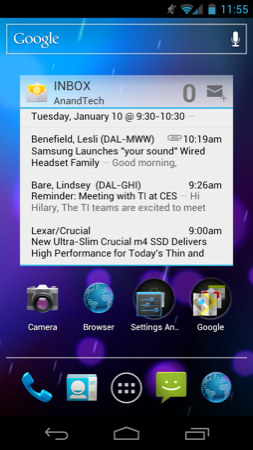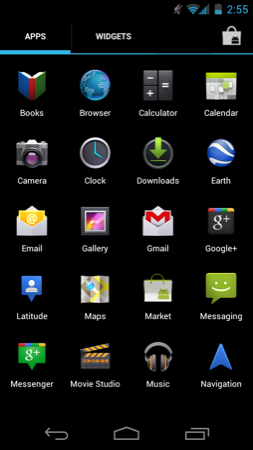Samsung Galaxy Nexus & Ice Cream Sandwich Review
by Brian Klug & Anand Lal Shimpi on January 18, 2012 1:34 PM ESTGoogle employs more than 20,000 people worldwide and the number of them working on Android are in the single digit percentage range. Google's business is search, but it has always had aspirations of more. Android isn't just a chance to capitalize on mobile search for Google, it's also an opportunity to grab power in the next era of personal computing. If you believe that smartphones will eventually replace mainstream PCs, who wouldn't want to be to smartphones what Microsoft was to PCs in the early 1990s?
Previous versions of Android have been cautious, evolutionary steps along a path to being a more open/flexible alternative to iOS. Starting with Honeycomb (Android 3.0) however, Google began to step out of the shadow of its competitors and really start to define Android as a mobile computing platform. Honeycomb was limited to tablets but its successor, Ice Cream Sandwich (Android 4.0), would bring unification to Android across both tablets and smartphones.
Today we look at both ICS and its launch vehicle, Google's Galaxy Nexus.
The Android vs. iOS Debate
It's very clear to me now more than ever that Apple and Google have completely different goals with their mobile OS strategies. Excluding the unclear strategy behind Chrome OS, Android is pretty much Google's primary operating system. The unified tablet/smartphone strategy behind Ice Cream Sandwich makes sense because for Google to succeed in the OS business it needs to deploy Android on everything from smartphones to notebooks. We've already seen the strengths in having a smartphone platform with a strong app ecosystem. Things become even more appealing if you have a phone, tablet and PC that all run the same OS and apps. As Android is Google's one-size-fits-all operating system, it needs to have a broader and slightly more ambitious focus than iOS otherwise it risks losing the race in the long run.
Apple is in a different position. It already has a successful desktop/notebook OS that is continuing to grow. While iOS has been a runaway success for Apple, the Mac OS X platform is a solid option for any user who needs more than their iPhone or iPad can provide. The two OSes may converge or at least borrow heavily from one another, but in the interim they can remain independent. If you need more of a computing experience Apple is happy to sell you a Mac. If you want the it-just-works appliance experience in your phone or tablet, Apple has a whole bunch of iPhone/iPad configurations to offer you.


ICS isn't a step towards iOS. If anything it proves that Google is committed to its own trajectory. Android is an OS that, although more closed than many would like, still allows more flexibility than iOS. You can sideload apps not purchased in the Market. The file system isn't completely hidden from you. You can even override the default zoom level on web pages. Apple and Google both pour tons of time and research into figuring out the best way to do something. And, to be honest, I feel like Apple generally does a better job of "getting it" for the very mainstream consumer. Rather than attempt to make the perfect mold however, Google gives you one that's a bit more flexible.
I've said this before but I do believe that Apple is trying to deliver more of an appliance experience, whereas Google is providing you with a modern take on a traditional computing experience. If the appliance is a smartphone, then both approaches are equally capable - it's just a matter of personal preference.
What's new in ICS really falls into one of three categories:
- Improvements in UI frame rate due to OpenGL ES rendering (non-skia) path
- UI tweaks
- New features
Nowhere in this list is a fundamental change in the way Android works. I feel that this is a very important point to understand and likely the cause for lots of disagreement when it comes to just how impressive (or not) ICS is.
ICS is smoother, more polished and has its own set of new features that make it a significant step forward for Android. What ICS is not however is an outright clone of iOS. If you prefer the iOS experience to Android, ICS will do nothing to change your opinion. If all you were missing from Android was a smoother UI, then its fourth major release should be almost everything you could ask for.










185 Comments
View All Comments
thecraw - Saturday, January 21, 2012 - link
couldn't stop laughing at that statement, sure no one is forcing you to use itunes, its your own problem if you want to backup your iproduct or upgrade your iOS etc.. yes no one is forcing you right...steven75 - Friday, February 10, 2012 - link
Have you never heard of iCloud? I mean are we in bizarro world here or is everyone really THAT clues on iOS 5?augustofretes - Monday, January 23, 2012 - link
I found comments like yours absolutely hilarious, because I don't own an iPhone, nor I'm interested on buying one, I'm perfectly happy with my Samsung Galaxy S II running CM9 ;-)You're not being objective, unless, of course, you only see your homescreen and never open any application.
The iPhone 4S is not perfect, I completely agree, but the interface is more fluid, this is fact, pinch-to-zoom is not a smooth, even on a GNex, as it on the 4S, but it's pretty smooth now.
Sorry mindless fanboy.
kebab77 - Sunday, February 5, 2012 - link
Serious performance boost for phones currently on Android 2.3.x:http://www.bestsmartphone.com/2012/02/05/android-4...
... Samsung Galaxy S2 still top of the pile!
macs - Wednesday, January 18, 2012 - link
My only suggestion is that there are some device that need a sort of priority for a review. Galaxy Nexus and ICS should be on this list like the Apple products (you already do that) and maybe a flagship WP 7 device like Lumia 800/900.We can wait a bit more for device like Razr, Lumia 710, various HTC, various Samsung,...
In 1 H 2012 my priority list will be Galaxy S 3, first device with Krait and Ipad 3.
Back at reading, I know this will be a good read!
Thank you
roedtogsvart - Wednesday, January 18, 2012 - link
Anand, just thought I'd throw this in there:For something like $25 (Verizon) you can buy an extended battery and gain an additional 250 mAh (1850 vs 2100) that adds basically no perceptible thickness to the device, though I did not precisely measure. Have you tested with the extended battery? I feel like it makes an already amazing phone even better.
Brian Klug - Thursday, January 19, 2012 - link
I managed to snag an extended battery for the RAZR review, but didn't get the chance to do the same with the CDMA/LTE Galaxy Nexus. I've seen that battery however, and it is a novel design - the back doesn't get thicker, just flatter (the whole phone is as thick as the bulge).We've seen pretty linear scalings before, so you can assume that extra 250 mAh will scale linearly as well.
-Brian
3DoubleD - Wednesday, January 18, 2012 - link
The task switcher is blazing fast on the Transformer Prime, so I'd say it's a Galaxy Nexus limitation and not an ICS limitation.Lucian Armasu - Thursday, January 19, 2012 - link
Anand didn't say it's an ICS issue either. He said it's a GPU issue, because older GPU's still can't handle HD resolutions very well, just like Tegra 2 GPU barely could, too.But I'm sure on lower-end ICS phones with lower resolutions, it should work faster, so it's not like every ICS phone will need a Tegra 3 GPU-level from now on.
GnillGnoll - Thursday, January 19, 2012 - link
He said it _could_ be a GPU issue. Something which I strongly doubt, it's not like the task switcher adds that much graphics load over rendering the normal UI.